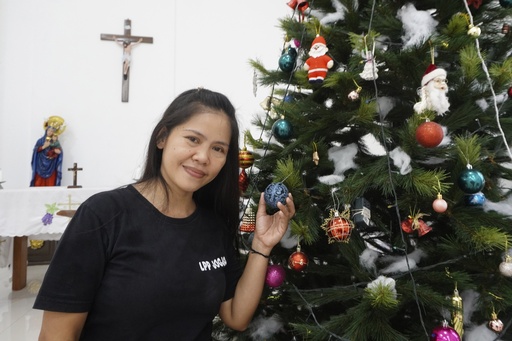
YOGYAKARTA, Indonesia — In May 2015, Filipino death row inmate Mary Jane Fiesta Veloso prayed as she was escorted to an execution site located just a short distance from her isolation cell on an Indonesian prison island, where a firing squad awaited her. At that moment, the Philippine government was concluding a lengthy legal process regarding her situation. Ultimately, just before her impending execution alongside eight others, the Indonesian Attorney General’s Office granted her a temporary reprieve.
In a poignant recount during a recent interview, Veloso shared her heartfelt prayers, expressing her despair and hope. “Lord, many people there believe that I am guilty, but many believe that I am innocent. You know everything; please prove my innocence by saving me,” she recalled tearfully from a women’s prison in Yogyakarta.
Veloso’s life was spared in order to allow her to testify against a criminal syndicate that had reportedly coerced her into becoming an unwitting drug courier. As she was led toward her potential execution, she was informed by officials of a stay of execution, leaving her in disbelief. Reflecting on a cocoon she had seen the night before, she interpreted it as a sign of new life awaiting her. “In the Philippines, we believe that if there is a cocoon, there will be a new life,” she said, believing God was granting her a second chance.
Now 39, Veloso was initially arrested in 2010 at Yogyakarta’s airport when authorities discovered nearly 2.6 kilograms (5.7 pounds) of heroin concealed in her luggage. A single mother of two sons, she was sentenced to death despite maintaining her innocence throughout her 14 years in prison. During her incarceration, she cultivated skills like design, painting, and tailoring.
Her reprieve was prompted by the arrest of Maria Kristina Sergio, the alleged mastermind behind Veloso’s recruitment, shortly before her scheduled execution. Two days before she was set to be executed, Sergio surrendered to authorities in the Philippines, leading to a request for cooperation from the Philippine government concerning Veloso’s case.
In a significant turn of events, Philippine President Ferdinand Marcos Jr. recently announced a deal for Veloso’s repatriation after years of advocacy from Manila. “Mary Jane Veloso is coming home,” he stated, describing her lengthy battle against drug trafficking charges.
A formal agreement between the Indonesia and the Philippines to facilitate Veloso’s transfer was signed on December 6. Since no formal treaty exists between the two nations, the arrangement was grounded in their shared membership in the Association of Southeast Asian Nations (ASEAN), which supports the mutual legal assistance between member countries.
The Indonesian minister for law and human rights celebrated the transfer agreement as a historic achievement, indicating it falls under President Prabowo Subianto’s “good neighbor” policy. Once Veloso is repatriated, the Filipino government can consider extending her clemency or a pardon, which would be within their jurisdiction.
Expressing her gratitude for the unexpected turn of fate, Veloso called the news of her reprieve “like a miracle when I had lost all hope.” Tears filled her eyes as she reflected on nearly 15 years spent away from her children and family. “I wish for an opportunity to take care of my children and be close to my parents,” she shared.
Born in Cabanatuan, Nueva Ecija province, Veloso was raised in a poor family. Her father worked in agriculture, while her mother collected recyclables to support their household. Leaving school in the first year of high school, Veloso married young and later became a single mother. In search of work, she emigrated to Dubai, but after an upsetting incident, she returned home. Shortly afterwards, she was recruited to work in Malaysia, but was later diverted to Indonesia.
The United Nations Office on Drugs and Crime recognizes Indonesia as a significant hub for drug trafficking, despite having some of the world’s strictest drug laws. There are currently around 530 individuals on death row in Indonesia, predominantly for drug offenses, with a noticeable number being foreign nationals.
“I was not a good Catholic before, but prison has transformed my life and brought me closer to God,” Veloso said. “I am ready to begin anew, like a butterfly emerging from a cocoon.”

